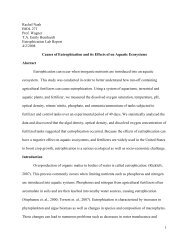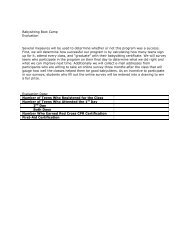Nash | 7“repurpose or add value to copyrighted work.” 31 In addition, Valenza and Johnson list forms ofcreativity that librarians need to cultivate and encourage in themselves and in their librarypatrons including such skills as making YouTube videos, Tweets, blog posts, and digitalstories. 32 These views of digital creative freedoms show us that librarians have a responsibility tothe public to support their right to build on the creations of others in order to enrich culturethrough new creative works.Though new technologies make the products of research easier to disseminate, currentcopyright laws have greatly decreased the ability of libraries to provide their scholarly patronswith legal access to materials for the purposes of advancing research. In the world of printresources, libraries purchased subscriptions to physical copies of scholarly journals. The rights toread, lend, and resell these physical copies were protected under the first sale doctrine. However,the rights guaranteed to owners of works in the analog environment do not cross over to thedigital one. The first sale doctrine does not apply to digital copies of scholarly journals or bookspurchased by libraries. This is because current copyright law holds that “every time you use acreative work in a digital context, the technology is making a copy.” 33 Digital Copyrightsuggests that one current copyright “trend is the piecemeal repeal of the so-called first saledoctrine, which historically… is the reasons why public libraries… are not illegal.” 34 Litman alsowarns that digital authority controls “could completely annul the first sale doctrine.” 35 As wemove further into the digital age, libraries increasingly rely on digital materials to meet thedemands of their patrons, and without the protection of the first sale doctrine, libraries could31 Ibid.32 Ibid., 31.33 Lessig, Remix: Making Art and Commerce Thrive in the Hybrid Economy, 98.34 Litman, Digital Copyright, 80.35 Ibid., 83.
Nash | 8potentially lose their ability to provide access to information for their patrons entirely. 36 Majororganizations such as the Library Copyright Alliance are fighting to change the worldviewconcerning digital copyright laws. They suggest that copyright laws must change to allowlibraries to make copies of all formats of digital materials for the purposes of preservation,interlibrary loans, lending, research, and private study. 37 This would effectively reinstate the firstsale doctrine for libraries in the digital world, regardless of whether the producers of intellectualproperty believe simply reading digital text makes a copy or not. However, threats to the rightsof libraries to distribute materials for the purpose of furthering research are also threatened bythe huge cost of providing access to digital versions of scholarly journals. Libraries now obtainlicense agreements with online databases that provide access to specific academic journals. Theprices of these online services are increasingly high, which decisively limits the number ofjournal subscriptions libraries can afford. 38 Additionally, in Free Culture Lessig writes that, “asjournals become electronic… publishers are demanding that libraries not give the general publicaccess to the journals.” 39 He notes that publishers especially want to make individuals paysubscriptions to read “scientific journals.” 40 The Wealth of Networks shows evidence that inEurope, where copyright legislation treats even raw data as intellectual property, this “proposeddatabase right is unnecessary and detrimental, particularly to scientific research.” 41 TheStatement of Principles on Copyright Exceptions and Limitations for Libraries and Archivesreacts to these practices by clearly stating that private contracts made with database providers36 Library Copyright Alliance, International Federation of Library Associations and Electronic Information forLibraries, Copyright Limitations and Exceptions for Libraries, 2.37 Electronic Information for Libraries, International Federation of Library Associations and Institutions and LibraryCopyright Alliance, Statement of Principles on Copyright Exceptions and Limitations for Libraries and Archives, 1.38 Joyce L. Ogburn, "Defining and Achieving Success in the Movement to Change Scholarly Communication,"Library Resources & Technical Services 52, no. 2 (April, 2008), 44-53, http://search.ebscohost.com/login.aspx?direct=true&db=aph&AN=31626650&site=ehost-live (accessed November 6, 2009): 44.39 Lessig, Free Culture: The Nature and Future of Creativity, 281.40 Ibid.41 Benkler, The Wealth of Networks: How Social Production Transforms Markets and Freedom, 449.






